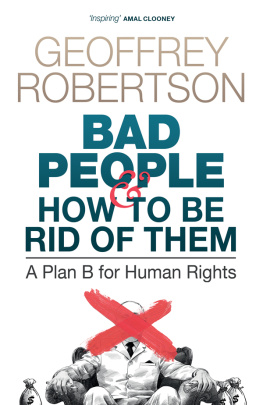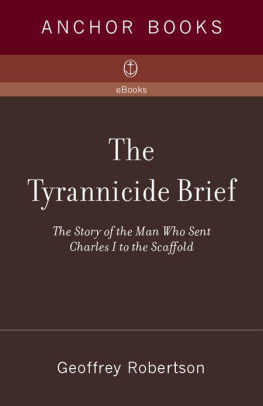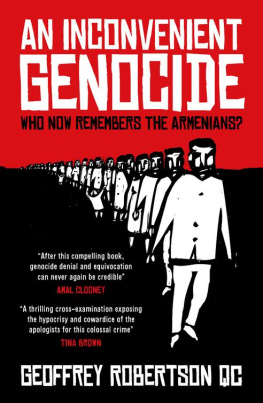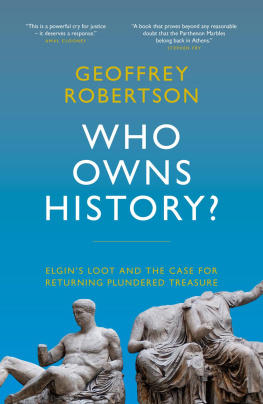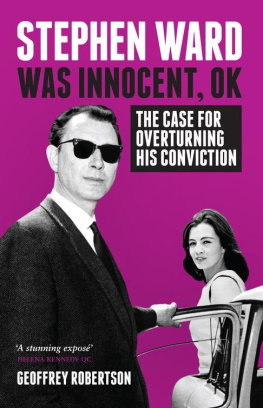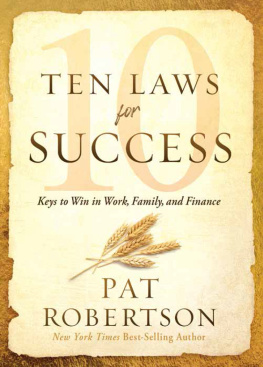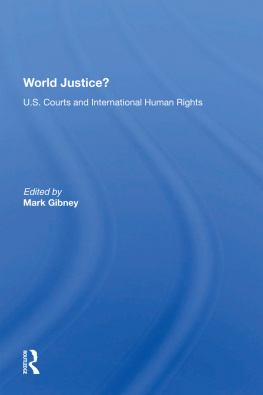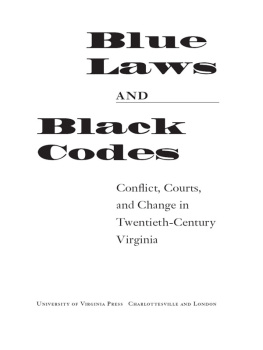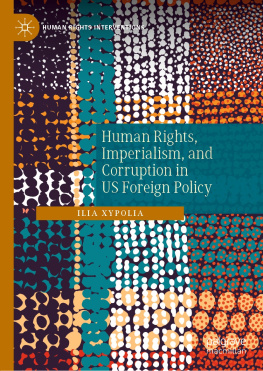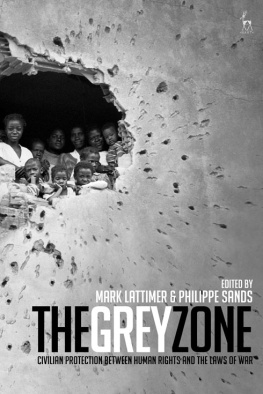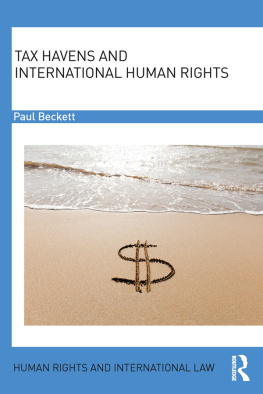About the Book
Twenty years ago Geoffrey Robertson inspired the global justice movement with his ground-breaking book Crimes Against Humanity . Since then, the movement has stalled as nationalism takes hold and populist governments retreat from international courts and refuse to comply with their rulings.
But there is an alternative. New laws, which have been called Magnitsky Laws, could be the Plan B for human rights.
Sergei Magnitsky was a Moscow tax lawyer who was tortured and killed for exposing Russian state corruption. In this powerful book, Geoffrey Robertson tells Magnitskys story and examines the connection between human rights abuses and corruption, and how both thrive on links with Western banks, casinos and even private schools. He argues for a comprehensive system of sanctions against individuals and corporations, rather than against states. Australia is considering enacting such laws.
This Plan B for the global justice movement can, argues Geoffrey Robertson, offer a potent solution to crimes being committed against humanity, and show the way forward for the global justice movement in the twenty-first century.
INTRODUCTION
H APPENSTANCE HAD ME BORN on 30 September 1946 the very day of the judgment at Nuremberg, which inaugurated international criminal law by declaring that it was individuals, not sovereign states or political parties, who must be held responsible for crimes against humanity. So the length of my life could serve as a kind of temporal measure of how far the world has come in realising that promise, embedded in the charter of the United Nations and entrusted to its Security Council. I joined in the demonstrations for sanctions on South Africa at university in the 1970s, and became a member of Amnesty, writing endless and aimless letters to tyrants (Dear your Excellency Idi Amin VC and bar; Dear General Pinochet) begging them to hold inquests into the deaths of the victims they had murdered. It was an ironic pleasure, a quarter of a century later, to act for Human Rights Watch in the proceedings against Pinochet to have him extradited and tried for torture.
By the late 1990s the Nuremberg legacy had been revived, with UN courts set up to try the bad people of the Balkans and then of Rwanda, and an agreement reached on establishing an International Criminal Court (ICC) in The Hague. I became the first president of the UNs war crimes court in Sierra Leone, which eventually imprisoned Liberias former president, Charles Taylor, for complicity in war crimes and crimes against humanity. By 2011 there was such confidence in international justice that when Syrian demonstrators took to the streets in Damascus, their banners read al-Assad to the Hague . Their expectations were, tragically, far too high they were mown down by machine-gun fire, and the pole-axed Security Council failed to protect them or the 400,000 who subsequently shared their fate.
It was in the same year that I received a brief to defend an American businessman named Bill Browder from a libel action brought by a Moscow policeman whom Browder had accused of complicity in the torture and death of his tax lawyer, Sergei Magnitsky. The case was brought in London (where free speech can be expensive) and was probably funded by the Russian government. In one way, this was a welcome development libel writs are more acceptable than poison as a way of silencing your critics so I spent a lot of time with Bill and his team drafting one of the longest ever libel defences. The case was thrown out because it belonged in Russia, with all the evidence about the torture and death of an innocent man in a Moscow prison. Then, in December 2012, President Obama signed the first Magnitsky law, which imposed targeted sanctions on sixteen individuals involved in Magnitskys death, including the litigious policeman.
A law permitting the use of sanctions targeted against individual human rights abusers was novel. National sanctions, general in nature, had been imposed on this and other grounds against Iraq in the 1990s, but had caused massive hardship to an already oppressed population. After 9/11 the United Nations imposed targeted sanctions on terrorists and their financiers. But Obamas Magnitsky law lassoed the bad judges, prosecutors and doctors who had negligently failed to treat a dying man. It was not that Magnitsky was a dissident or political prisoner he had nothing in common with most of Putins opponents, which in a sense made his case more important. He was an ordinary person allowed to die by a system of institutional cruelty.
Imposing sanctions in this way became a lightbulb moment for the global justice movement, stymied by the superpower veto wielded by Russia and China and America in the Security Council against referrals to the ICC, the Plan A for combating human rights abuses by trial and imprisonment of perpetrators. In consequence, international criminal justice had begun to falter, concentrating on Congolese warlords but unable to prosecute Bashar al-Assad or persecutors of the Rohingya or the Tamils, let alone the assassins of Saudi journalist Jamal Khashoggi (the current problems with the Plan A are described in ).
There are unresolved human rights issues in Western countries the Black Lives Matter movement highlighting some current problems and human rights initiatives emanating from them can be superficially condemned as reflecting a superiority associated with colonialism or racial condescension. But if human rights are universal, democratic countries should answer cries for justice by citizens of other countries when those cries have been ignored by their own governments. There can be no sensible objection if democratic nations, using their own domestic law, provide a mechanism for accountability and for asserting their own values by ostracising bad people in other states who are complicit in killings and corruption, but who then want to enjoy the pleasures, and the banking facilities, of the West.
True it is, and an historic and observable fact, that fundamental human rights have arisen in, and tend to be more respected by, liberal democracies. There is no a priori reason why this should be so: anyone living under an illiberal democracy, or communism or in a theocracy or under the sway of authoritarian populism, should be free from torture or assassination or slavery and should, if prosecuted, have independent judges and be given the chance of a fair trial.
These are not Western values so much as universal values, and countries in the West and anywhere else are entitled to assert them by calling out and throwing out individuals who can be proved to have betrayed them. To do so, in relation to nationals of a particular country, is not (as China always says) an interference in its internal affairs, it is marking a red line in how human beings should be treated. It does not amount to an attack on authoritarian states: it is rather an attack on those apparatchiks of authoritarianism who can be proved to have breached international law. Moreover, this book contends that open societies will have a better future by closing their doors to tainted people and corporations, and their money and property and close associates, and consequently to their malign power and influence.
Do targeted sanctions work? It is too early to say, but there are indications that they do; that they have stopped wealthy targets from doing business in international markets and from travelling to places they crave to visit. One purpose of this book is to argue that these kinds of sanctions must go further, providing real deterrence by preventing family members from travelling to take advantage of schools and hospitals in the West. Such sanctions must be imposed on the train drivers to Auschwitz, those lickspittle judges and prosecutors who unquestioningly do the bidding of autocratic governments, and on the prison doctors who leave prisoners to die, or who oversee torture sessions.

